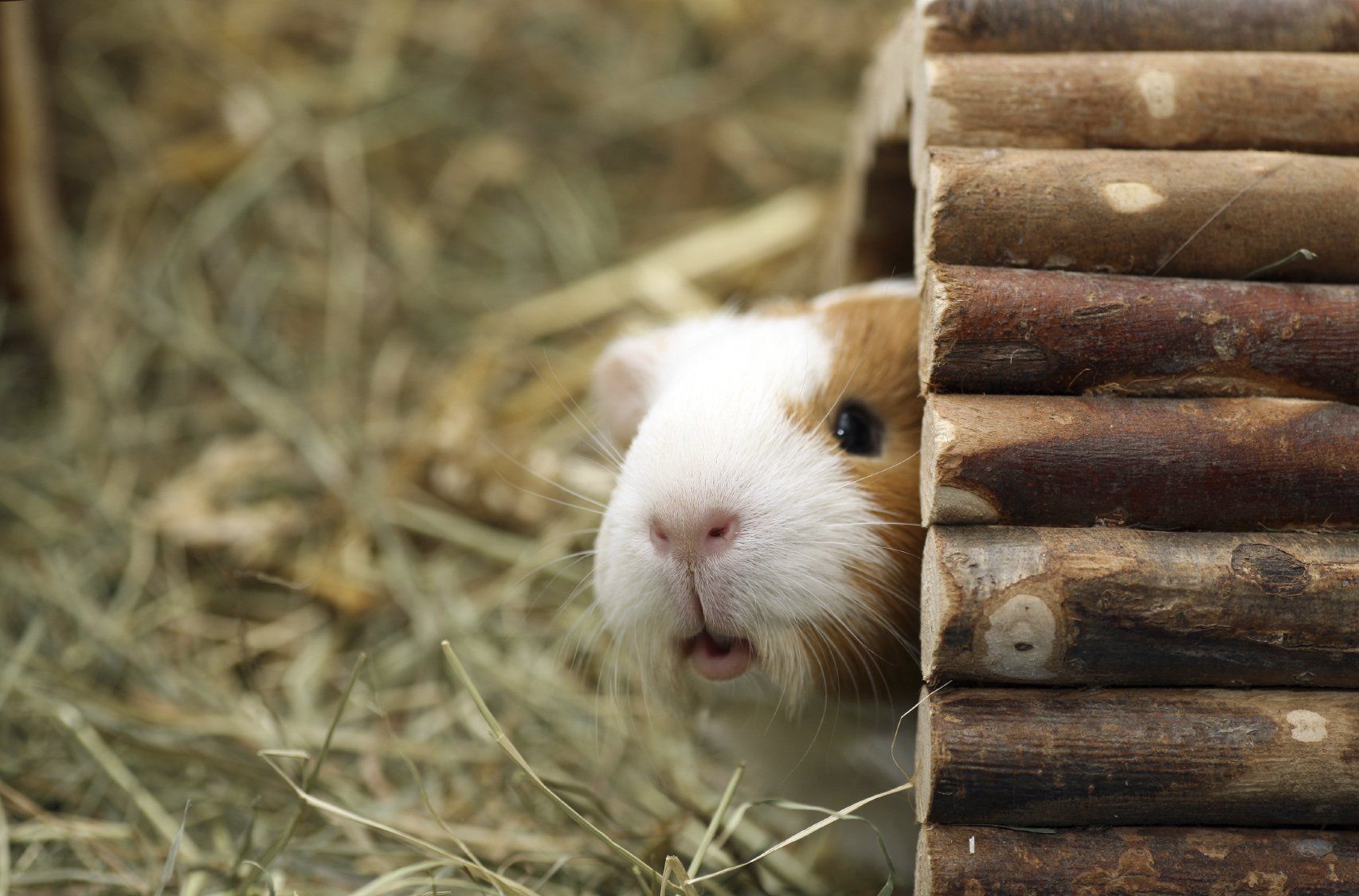The guinea pig
Longevity: 6-7 years on average
Weight: 700-800g for females
900g-1.1kg for males
Habitat:
- Cage structure: mesh for natural ventilation
- Size of the cage: the largest possible because the guinea pig needs space to make
exercise (100x60x50 cm minimum)
- Location of the cage: avoid exposure to drafts and position the cage in a quiet place; the guinea pig fears the heat: do not put the cage near a radiator or behind a window in the sun in summer
- Substrate: the bottom of the cage must be covered with hemp litter or a soft surface (terry towel, Drybed) which will be changed at least once a week, in order to prevent pododermatitis. Avoid wood shavings, which are too dusty.
- Enrichment of the cage: provide a hiding place per animal in order to avoid conflicts and have tunnels, hammocks and toys to occupy your guinea pigs. Prefer a terracotta bowl rather than a bottle for water, which can be the cause of dental problems or neck pain. The water should be changed daily.
- Avoid living with rabbits.
Behaviour:
It is a diurnal animal, which lives in groups. It is not recommended to adopt a guinea pig alone because it would be stressed and could develop behavioral problems. It is therefore advisable to sterilize the males to avoid reproduction.
Handling:
Guinea pigs are easy to handle but can stress out quickly and vocalize loudly. The ideal is to place one hand around the thorax behind the front legs and one hand under the rear axle to hold it.
Reproduction:
The gestation period is 68 days on average. The young are precocial: they are born with their eyes open and the hairs begin to grow, they will be able to fend for themselves quickly. Weaning takes place around the age of 1 month: breastfeeding is important, even if the little ones are able to eat solid food from the first days after birth. Guinea pigs reach sexual maturity at the age of 1 to 2 months in females and 2 to 4 months in males.
Feed:
Giving an appropriate diet will prevent a large number of common diseases in guinea pigs (dental diseases, chronic digestive disorders, urinary diseases, obesity, etc.).
- The hay:
It allows the wear of the teeth and brings essential fibers to the intestinal transit: it is essential. The hay must be chosen very green, unpacked and not dusty and must be kept in a closed package in a dry place. Hay made from timothy or cocksfoot is ideal. Avoid alfalfa hay, which is too rich in calcium. The hay must be distributed at will, in a rack or a hay ball, and will be renewed once or twice a day. - Fresh vegetables: Fresh vegetables (vegetables, greens, fruits) can be distributed in 2 meals per day, varying the vegetables as much as possible (6 different per day minimum). Avoid giving too many carrots or fruits, which are very high in sugar and are treats. An adult guinea pig consumes between 150 and 200g of fresh vegetables. Fresh plants must be introduced very gradually into the diet in order to avoid digestive disorders, until a diversified daily ration is obtained.
| Recommended | Not recommended or in small quantities | outlaw | |
|---|---|---|---|
| Vegetables/Greenery | Eggplant, broccoli, celeriac, celeriac, Chinese cabbage, cucumber, zucchini, carrot/fennel/radish tops, fennel, parsnips, dandelions, bell pepper, radish, arugula, rutabaga, tomato, strawberry/raspberry/mulberry/hazelnut leaves / willow, grass, nettle, mint | Asparagus, batavia, beetroot, carrot, Brussels sprouts, cauliflower, kale, green cabbage, endive, frisee, green beans, pumpkin, clover, dill, basil, tarragon, parsley, thyme | Garlic, avocado, chives, beet/turnip tops, lettuce, onion, leek, rhubarb, sorrel, savory, sage |
| Fruits | Apricot, pineapple, banana, clementine, strawberry, raspberry, passion fruit, kiwi | Date, pomegranate, currant, lychee, mandarin, mango, melon, blackberry, orange, grapefruit, peach, pear, apple, grape | figues |
- pellets:
They complete the ration and must be distributed in limited quantities because they are very caloric and rich in calcium: 1 tablespoon per day for an adult guinea pig. You will easily find pellets for guinea pigs in the trade, on the other hand the mixtures of seeds are to be banned because the guinea pigs tend to sort and eat only the most fatty or sweet.
- Vitamin C:
A daily supply of vitamin C is essential for the guinea pig because it is unable to synthesize it and a deficiency can cause various pathologies. The daily requirements are 10 to 25 mg/kg in an adult guinea pig and 30 to 60 mg/kg in a growing, pregnant, lactating or sick guinea pig. The contribution can be made in 2 forms:
- Liquid presentation, to drink directly from the syringe (in general the taste is appreciated)
- In the form of tablets, to be given as a delicacy.
Avoid diluting vitamin C in drinking water, because it is destroyed in less than 2 hours by light and the chlorine contained in the water, and the quantity ingested is difficult to control.



